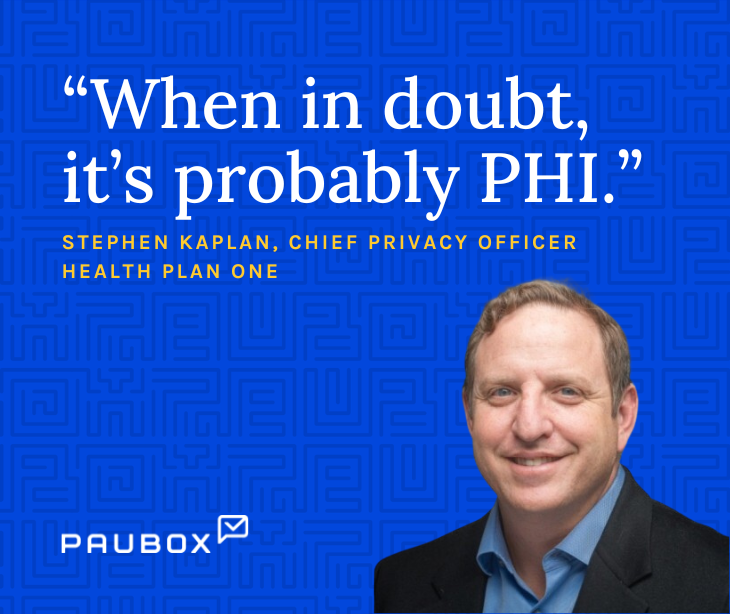
Email is a common way to share healthcare emails, making it one of the riskiest channels for data breaches. To keep emails HIPAA compliant healthcare organizations need to follow guidelines designed to safeguard protected health information (PHI).
HIPAA compliant email basics
According to guidance from the HHS FAQs for Professional section, it can be determined that “ The Privacy Rule allows covered health care providers to communicate electronically, such as through email, with their patients, provided they apply reasonable safeguards when doing so. See 45 C.F.R. § 164.530(c).”
The section of HIPAA mentioned, 45 C.F.R. § 164.530(c), is the safeguard standard setting the requirements for covered entities to protect any electronic communication. This means they must have structured systems in place, like staff training and secure data storage, to prevent unauthorized access and ensure patient confidentiality.
The rule requires that covered entities use reasonable measures to prevent accidental and deliberate patient information breaches. A few of these reasonable measures of protection include:
- Use a HIPAA compliant email platform with encryption.
- Limit the use of personal health information (PHI) in emails.
- Secure email lists with restricted access to authorized personnel.
- Include opt-out mechanisms in every marketing email.
- Monitor email activity with detailed audit trails.
- Regularly train staff on HIPAA compliance requirements.
- Make sure a business associate agreement (BAA) are in place with email providers.
- Conduct risk assessments to identify and address vulnerabilities.
The standard also provides that organizations need to protect patient data even during everyday activities where information might unintentionally be exposed, like conversations between staff. In these cases, safeguards like private consultation rooms or limiting access to records help prevent incidental exposure.
The best practices for HIPAA compliant email
Healthcare organizations often differ in size and operation making it impossible to create a singular approach to ensuring the necessary emails sent remain HIPAA compliant. Based on statistical facts contributed from Paubox’s April 2024 HIPAA Breach Report we can determine basic methods of navigating compliance.
These include:
- Network server segmentation: Since network server breaches affect the most people, segment email marketing servers from primary network servers. This isolation limits the spread of attacks to other critical systems.
- Zero trust architecture: Adopt a zero trust architecture for large and small organizations, meaning no system or user is automatically trusted. Require continuous verification for email marketing systems, especially when accessing PHI.
- Data redaction & anonymization: Automatically redact or anonymize sensitive data in marketing lists and emails, particularly for small organizations that often lack comprehensive IT support. This reduces the likelihood of PHI exposure in emails.
- Role-based access with monitoring: Use granular, role-based access to marketing email lists and monitor for abnormal access attempts. Large organizations can use automated monitoring tools, while smaller ones can set up alert systems.
- Phishing resilience training: Given email breaches remain a frequent vector, conduct targeted phishing awareness training that covers real world scenarios like spear phishing attacks.
- Regular penetration testing: Perform penetration testing regularly to identify vulnerabilities in email marketing systems. Small organizations can rely on external specialists, while larger ones can leverage in-house teams.
- Content review mechanism: Establish a review mechanism where compliance experts or privacy officers approve all email campaigns, ensuring they follow HIPAA regulations.
- Consent optimization: Set clear opt-in and opt-out mechanisms to ensure patients can easily manage their consent for receiving emails.
The real life consequences of insufficient HIPAA compliant email
The 2023 Pentagon email breach exemplifies the consequences of insufficient HIPAA compliant email practices by revealing the scale of data exposure possible when sensitive information isn't adequately protected. The breach occurred because a government cloud email server, which was supposed to be secure, was misconfigured and connected to the internet without a password requirement.
This allowed anyone with the server’s IP address to access around three terabytes of military emails containing highly sensitive personal and health information. Though no classified data was leaked, personal identifiable information (PII), including Social Security numbers and health records, was exposed, affecting over 20,000 individuals.
The after-effects of insufficient protections that follow a potential breach stemming from inadequate safeguards include:
- PHI can be exposed to unauthorized parties, leading to identity theft and fraud.
- Sensitive health data may be accessed and misused, compromising patient privacy.
- Organizations face potential fines and penalties due to HIPAA non-compliance (like the $100,000 settlement instituted by the HHS)
- Patients lose trust in healthcare organizations that mishandle their information.
- Legal actions can be initiated by affected individuals or groups.
- Organizations may have to spend time and resources notifying individuals and managing the fallout.
See also: Top 12 HIPAA compliant email services
FAQs
What is the specific definition of PHI under HIPAA?
Under HIPAA, PHI includes any health data that can be linked to an individual, such as medical records, billing information, or demographic details.
What kind of encryption methods are required for HIPAA compliance?
TLS 1.2 or higher.
Are there any exceptions where HIPAA regulations don't apply to certain types of information or organizations?
HIPAA regulations do not apply to de identified health information that has been stripped of personally identifiable details or to organizations that don't handle PHI.
Subscribe to Paubox Weekly
Every Friday we'll bring you the most important news from Paubox. Our aim is to make you smarter, faster.




